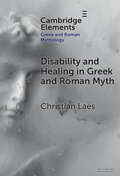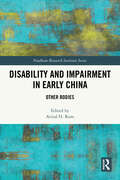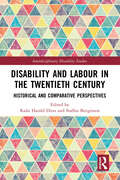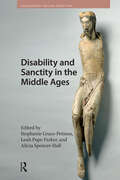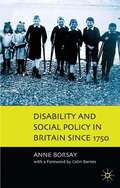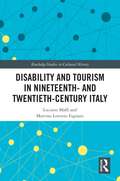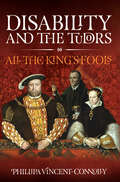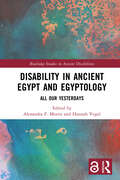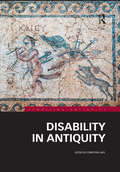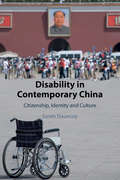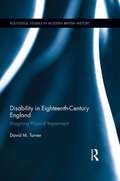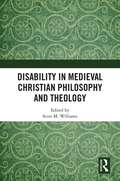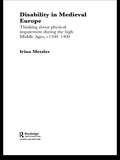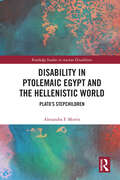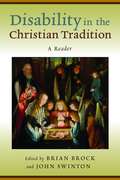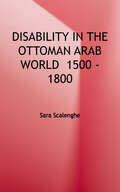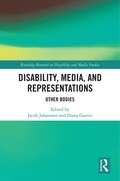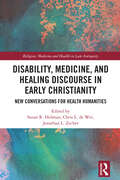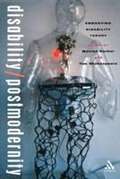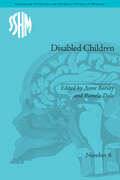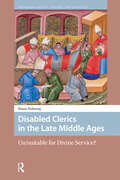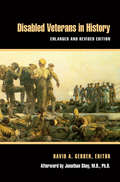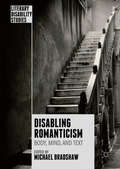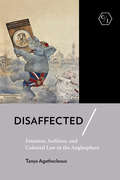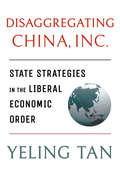- Table View
- List View
Disability and Healing in Greek and Roman Myth (Elements in Greek and Roman Mythology)
by Christian LaesDisability and Healing in Greek and Roman Myth takes its readers to stories, in versions known and often unknown. Disabilities and diseases are dealt with from head to toe: from mental disorder, over impairment of vision, hearing and speaking, to mobility problems and wider issues that pertain to the whole body. This Element places the stories in context, with due attention to close reading, and pays careful attention to concepts and terminology regarding disability. It sets Graeco-Roman mythology in the wider context of the ancient world, including Christianity. One of the focuses is the people behind the stories and their 'lived' religion. It also encourages its readers to 'live' their ancient mythology.
Disability and Impairment in Early China: Other Bodies (Needham Research Institute Series)
by Avital H. RomThis book is the first collection of scholarly works fully dedicated to exploring disability and impairment in early Chinese history.Early Chinese understandings of disability are effectively revealed through investigations of a wide range of aspects, such as terminological, legal, political, and etiological. The volume explores how early Chinese disability was socially negotiated as a means for creating enabled and at times empowered identities. It shows how oppression and empowerment, when viewed through the prism of such negotiations of identity, were not mutually exclusive. Through such examinations, the volume demonstrates how an approach sensitive to both the separability and the interconnectedness of disability and impairment enables a more nuanced understanding of Chinese disability history specifically, and Chinese notions of embodiment more generally.Bringing together international academics to examine a plethora of topics relating to disability and bodily impairment in early Chinese history, with an eye on their socio-political implications, this book will appeal to students and scholars of Chinese History, History of Medicine, and Disability Studies.
Disability and Labour in the Twentieth Century: Historical and Comparative Perspectives (Interdisciplinary Disability Studies)
by Radu Harald Dinu Staffan BengtssonThis volume puts disability and labour at the centre of historical enquiry. It offers fresh perspectives on the history of disability and labour in the twentieth century and highlights the need to address the topic beyond regional boundaries. Bringing together historians and disability scholars from a variety of disciplines and regions, the chapters investigate various historical settings, ranging from work cooperatives to disability associations and informal workplaces, and analyse multiple meanings of labour in different political and economic systems through the lens of disability. The book’s contributors demonstrate that the nexus between labour and disability in modern, industrialised societies resists easy generalisations, as marginalisation and integration were often two sides of the same coin: While the experience of many disabled people has been marked by exclusion from mainstream production, labour also became a vehicle for integration and emancipation. Addressing one of the research gaps of the disability history field, which has long been dominated by British and North American perspectives, the book sheds light on less-studied examples from Scandinavian countries and Eastern Europe including Czechoslovakia, Poland, the Soviet Union, Bulgaria and Romania. Cutting across national, cultural and class divides the volume provides a springboard for reflections on common experiences of disability and labour during the twentieth century. It will be of interest to all scholars and students working in the field of disability studies, sociology and labour history.
Disability and Sanctity in the Middle Ages (Hagiography Beyond Tradition)
by Stephanie Grace-Petinos Leah Pope Parker Alicia Spencer-HallThis volume significantly expands current understandings of both disability and sanctity in the Middle Ages. Across the collection, heterogeneous constructions, and experiences, of disability and holiness are excavated. Analyses span the sixth to the fifteenth century, with discussion of holy men and holy women, Western Christian and Buddhist traditions, hagiographic texts, images, and artefacts. Each chapter underscores that disability and sanctity co-exist with a vast array of connotations, not just fully positive or fully negative, but also every inflection in between. The collection is a powerful rebuttal to the notion of the integral relationship of disability—medieval and otherwise—with sin, stigma, and shame. So doing, it recentres medieval disability history as a lived history that merits exploration and celebration. In this way, the volume serves to reclaim sanctity in disability histories as a means to affirm the possibility of radical disability futures.
Disability and Social Policy in Britain Since 1750: A History of Exclusion
by Anne BorsayThis book explores experiences of physical and mental impairment in Britain since the Industrial Revolution. The book's starting point is the exclusion of disabled people from the full rights of citizenship because of their marginality to the labor market. Institutional living and community care are then examined with reference to the changing mixed economy of health and social care. Literary, oral and visual sources complement documentary evidence, and particular attention is paid to the personal testimonies of disabled people.
Disability and Tourism in Nineteenth- and Twentieth-Century Italy (Routledge Studies in Cultural History #104)
by Luciano Maffi Martino Lorenzo FagnaniAttention to the issue of disabilities has intensified in recent decades, prompting States and organizations to respond with appropriate measures to promote inclusion of persons with disabilities in all social environments. This book’s thesis is that the seeds of this inclusivity were planted by the development of tourism for people with disabilities in the nineteenth and twentieth centuries. The book explores the development of tourism for people with disabilities in Italy during this time period. It adds an important tessera to the mosaic of international literature that has rarely considered the history of tourism and the history of disabilities in a unified manner. While certainly of great interest to an Italian audience, the discussion of the various responses taking form in Italy to the needs of persons with disabilities, and the role these responses have played in the development of mass tourism generally, is also quite pertinent to international contexts. This book is based largely on unpublished sources. The authors’ hope is that the presentation of these new materials combined with the innovative approach of a historical study of tourism through the lens of disabilities will open up international scholarly debate and discussion drawing in contributions from all disciplines.
Disability and the Tudors: All the King's Fools
by Phillipa Vincent ConnollyThroughout history, how society treated its disabled and infirm can tell us a great deal about the period. Challenged with any impairment, disease or frailty was often a matter of life and death before the advent of modern medicine, so how did a society support the disabled amongst them? For centuries, disabled people and their history have been overlooked - hidden in plain sight. Very little on the infirm and mentally ill was written down during the renaissance period. The Tudor period is no exception and presents a complex, unparalleled story. The sixteenth century was far from exemplary in the treatment of its infirm, but a multifaceted and ambiguous story emerges, where society’s ‘natural fools’ were elevated as much as they were belittled. Meet characters like William Somer, Henry VIII’s fool at court, whom the king depended upon, and learn of how the dissolution of the monasteries contributed to forming an army of ‘sturdy beggars’ who roamed Tudor England without charitable support. From the nobility to the lowest of society, Phillipa Vincent-Connolly casts a light on the lives of disabled people in Tudor England and guides us through the social, religious, cultural, and ruling classes’ response to disability as it was then perceived.
Disability in Ancient Egypt and Egyptology: All Our Yesterdays (Routledge Studies in Ancient Disabilities)
by Alexandra F. Morris Hannah VogelThis book explores disability across time and space—from ‘ancient Egypt’ as a culture to Egyptology as a contemporary field—to go beyond simply identifying disability, encouraging readers to thoughtfully consider the history of disabled people in ancient Egypt and Egyptology.Through a critical investigation, this volume reshapes often-overlooked narratives of disability within the discipline of Egyptology and Egyptian Archaeology. Chapters explore evidence of disability, the historiographical ways in which disability has been approached, and how disability histories are (mis)represented in various contemporary spaces. Coverage stretches across Egypt and Nubia from the Predynastic to the Roman periods, as well as receptions of these cultures and disability in museums. Its editors and many of its authors are disability community members who are experts in their respective professions, comprising an international authorship and including voices from typically underrepresented groups. Contributors range from early career researchers to senior scholars, as well as those working outside of and adjacent to academia. While focusing on ancient Egypt and Egyptology, this volume offers new ways to consider disability in the broadest possible sense. It uses terminology informed by the disability community and offers guidance for disability inclusivity in curatorial and pedagogical museum and university contexts. It prioritises disability as an essential area of research in ancient world studies, and platforms both ancient and modern disabled voices. The deep, detailed exploration into disability in the past and in our discipline offered by this book inspires readers to further explore and appreciate the infinite diversity of the human experience in all its infinite combinations.The first-book length treatment of the subject, Disability in Ancient Egypt and Egyptology provides a much-needed resource for students and scholars of ancient Egypt, Egyptology, and disability in the ancient world. It is also suitable for researchers in Disability Studies, practitioners in broader ancient world studies, and museum and heritage professionals. Chapter 1 of this book is freely available as a downloadable Open Access PDF at http://www.taylorfrancis.com under a Creative Commons Attribution-Non Commercial-No Derivatives 4.0 license.
Disability in Antiquity (Rewriting Antiquity)
by Christian LaesThis volume is a major contribution to the field of disability history in the ancient world. Contributions from leading international scholars examine deformity and disability from a variety of historical, sociological and theoretical perspectives, as represented in various media. The volume is not confined to a narrow view of ‘antiquity’ but includes a large number of pieces on ancient western Asia that provide a broad and comparative view of the topic and enable scholars to see this important topic in the round. Disability in Antiquity is the first multidisciplinary volume to truly map out and explore the topic of disability in the ancient world and create new avenues of thought and research.
Disability in Contemporary China: Citizenship, Identity and Culture
by Sarah DaunceySarah Dauncey offers the first comprehensive exploration of disability and citizenship in Chinese society and culture from 1949 to the present. Through the analysis of a wide variety of Chinese sources, from film and documentary to literature and life writing, media and state documents, she sheds important new light on the ways in which disability and disabled identities have been represented and negotiated over this time. She exposes the standards against which disabled people have been held as the Chinese state has grappled with expectations of what makes the 'ideal' Chinese citizen. From this, she proposes an exciting new theoretical framework for understanding disabled citizenship in different societies – 'para-citizenship'. A far more dynamic relationship of identity and belonging than previously imagined, her new reading synthesises the often troubling contradictions of citizenship for disabled people – the perils of bodily and mental difference and the potential for personal and group empowerment.
Disability in Eighteenth-Century England: Imagining Physical Impairment (Routledge Studies in Modern British History)
by David M. TurnerThis is the first book-length study of physical disability in eighteenth-century England. It assesses the ways in which meanings of physical difference were formed within different cultural contexts, and examines how disabled men and women used, appropriated, or rejected these representations in making sense of their own experiences. In the process, it asks a series of related questions: what constituted ‘disability’ in eighteenth-century culture and society? How was impairment perceived? How did people with disabilities see themselves and relate to others? What do their stories tell us about the social and cultural contexts of disability, and in what ways were these narratives and experiences shaped by class and gender? In order to answer these questions, the book explores the languages of disability, the relationship between religious and medical discourses of disability, and analyzes depictions of people with disabilities in popular culture, art, and the media. It also uncovers the ‘hidden histories’ of disabled men and women themselves drawing on elite letters and autobiographies, Poor Law documents and criminal court records. The book won the Disability History Association Outstanding Publication Prize in 2012 for the best book published worldwide in disability history and also inspired parts of the Radio 4 series, ‘Disability: A New History’, on which the author was historical adviser. The series gained 2.6 million listeners when it first aired in 2013.
Disability in Medieval Christian Philosophy and Theology
by Scott M. WilliamsThis book uses the tools of analytic philosophy and close readings of medieval Christian philosophical and theological texts in order to survey what these thinkers said about what today we call ‘disability.’ The chapters also compare what these medieval authors say with modern and contemporary philosophers and theologians of disability. This dual approach enriches our understanding of the history of disability in medieval Christian philosophy and theology and opens up new avenues of research for contemporary scholars working on disability. The volume is divided into three parts. Part One addresses theoretical frameworks regarding disability, particularly on questions about the definition(s) of ‘disability’ and how disability relates to well-being. The chapters are then divided into two further parts in order to reflect ways that medieval philosophers and theologians theorized about disability. Part Two is on disability in this life, and Part Three is on disability in the afterlife. Taken as a whole, these chapters support two general observations. First, these philosophical theologians sometimes resist Greco-Roman ableist views by means of theological and philosophical anti-ableist arguments and counterexamples. Here we find some surprising disability-positive perspectives that are built into different accounts of a happy human life. We also find equal dignity of all human beings no matter ability or disability. Second, some of the seeds for modern and contemporary ableist views were developed in medieval Christian philosophy and theology, especially with regard to personhood and rationality, an intellectualist interpretation of the imago Dei, and the identification of human dignity with the use of reason. This volume surveys disability across a wide range of medieval Christian writers from the time of Augustine up to Francisco Suarez. It will be of interest to scholars and graduate students working in medieval philosophy and theology, or disability studies.
Disability in Medieval Europe: Thinking about Physical Impairment in the High Middle Ages, c.1100–c.1400 (Routledge Studies in Medieval Religion and Culture)
by Irina MetzlerThis impressive volume presents a thorough examination of all aspects of physical impairment and disability in medieval Europe. Examining a popular era that is of great interest to many historians and researchers, Irene Metzler presents a theoretical framework of disability and explores key areas such as: medieval theoretical concepts theology and natural philosophy notions of the physical body medical theory and practice. Bringing into play the modern day implications of medieval thought on the issue, this is a fascinating and informative addition to the research studies of medieval history, history of medicine and disability studies scholars the English-speaking world over.
Disability in Ptolemaic Egypt and the Hellenistic World: Plato’s Stepchildren (Routledge Studies in Ancient Disabilities)
by Alexandra F. MorrisThis is one of the first single-authored books to utilise Critical Disability Studies and the lens of embodiment to comprehensively unveil, explore, and celebrate disability in Ptolemaic Egypt and the Hellenistic world through a critical examination of art, artefacts, texts, and human remains.Through a thoughtful investigation, this volume reveals often-overlooked narratives of disability within Ptolemaic Egypt and the larger Hellenistic world (332 BCE to 30 BCE). Chapters explore evidence of physical and intellectual disability, ranging from named individuals; representations of people and mythological figures with dwarfism, blindness and vision impairments; cerebral palsy; mobility impairments; spinal disability; and medicine, healing, and prosthetics. Morris examines the historiographical ways in which disability has been approached, and how ancient disability histories are (mis)represented in various contemporary spaces. It uses terminology informed by the disability community and offers guidance for disability inclusivity in curatorial and pedagogical museum and university contexts, as well as prioritizing disability as an essential area of research in ancient world studies and assisting readers with the identification of ancient disability artefacts.The first-book length treatment of the subject, Disability in Ptolemaic Egypt and the Hellenistic World provides a much-needed resource for students and scholars of ancient Egypt, Egyptology, Classics, Classical Studies, and disability in the ancient world. It is also suitable for researchers in Disability Studies, practitioners in broader Ancient World Studies, and museum and heritage professionals. It is accessible to disabled people curious about their own history, as well as nondisabled people interested in disability history and those interested in a more accurate view of ancient Egyptian history.
Disability in the Christian Tradition: A Reader
by John Swinton Brian BrockFor two millennia Christians have thought about what human impairment is and how faith communities and society should respond to people with perceived impairments. But never has one volume collected the most significant Christian writings on disability. This book fills that gap. Brian Brock and John Swinton's Disability in the Christian Tradition brings together for the first time key writings by thinkers from all periods of Christian history - including Augustine, Aquinas, Julian of Norwich, Luther, Calvin, Hegel, Kierkegaard, Bonhoeffer, Barth, Hauerwas, and more. Fourteen contemporary experts in theology and disability studies guide readers through each era or group of thinkers, offering clear commentary and highlighting important themes.
Disability in the Ottoman Arab World, 1500-1800 (Cambridge Studies in Islamic Civilization Ser.)
by Sara ScalenghePhysical, sensory, and mental impairments can influence an individual's status in society as much as the more familiar categories of gender, class, religion, race, and ethnicity. This was especially true of the early modern Arab Ottoman world, where being judged able or disabled impacted every aspect of a person's life, including performance of religious ritual, marriage, job opportunities, and the ability to buy and sell property. Sara Scalenghe's book is the first on the history of both physical and mental disabilities in the Middle East and North Africa, and the first to examine disability in the non-Western world before the nineteenth century. Unlike previous scholarly works that examine disability as discussed in religious texts such as the Qur'an and the Hadith, this study focuses on representations and classifications of disability and impairment across a wide range of biographical, legal, medical, and divinatory primary sources.
Disability, Media, and Representations: Other Bodies (Routledge Research in Disability and Media Studies)
by Jacob Johanssen Diana GarrisiBringing together scholars from around the world to research the intersection between media and disability, this edited collection aims to offer an interdisciplinary exploration and critique of print, broadcast and online representations of physical and mental impairments.Drawing on a wide range of case studies addressing how people can be ‘othered’ in contemporary media, the chapters focus on analyses of hateful discourses about disability on Reddit, news coverage of disability and education, media access of individuals with disabilities, the logic of memes and brain tumour on Twitter, celebrity and Down Syndrome on Instagram, disability in TV drama, the metaphor of disability for the nation; as well as an autoethnography of treatment of breast cancer. Providing a much-needed global perspective, Disability, Media, and Representations examines the relationship between self-representation and representations in either reinforcing or debunking myths around disability, and ways in which academic discourse can be differently articulated to study the relationship between media and disability. This book will be of interest to students and researchers of disability studies and media studies as well as activists and readers engaged in debates on diversity, inclusivity and the media.
Disability, Medicine, and Healing Discourse in Early Christianity: New Conversations for Health Humanities (Religion, Medicine and Health in Late Antiquity)
by Chris L. de Wet Jonathan L. Zecher Susan R. HolmanUsing contemporary theories drawn from health humanities, this volume analyses the nature and effects of disability, medicine, and health discourse in a variety of early Christian literature. In recent years, the "medical turn" in early Christian studies has developed a robust literature around health, disability, and medicine, and the health humanities have made critical interventions in modern conversations around the aims of health and the nature of healthcare. Considering these developments, it has become clear that early Christian texts and ideas have much to offer modern conversations, and that these texts are illuminated using theoretical lenses drawn from modern medicine and public health. The chapters in this book explore different facets of early Christian engagement with medicine, either in itself or as metaphor and material for theological reflections on human impairment, restoration, and flourishing. Through its focus on late antique religious texts, the book raises questions around the social, rather than biological, aspects of illness and diminishment as a human experience, as well as the strategies by which that experience is navigated. The result is an innovative and timely intervention in the study of health and healthcare that bridges current divides between historical studies and contemporary issues. Taken together, the book offers a prismatic conversation of perspectives on aspects of care at the heart of societal and individual "wellness" today, inviting readers to meet or revisit patristic texts as tracings across a map of embodied identity, dissonance, and corporal care. It is a fascinating resource for anyone working on ancient medicine and health, or the social worlds of early Christianity.
Disability/Postmodernity: Embodying Disability Theory
by Tom Shakespeare Mairian CorkerWith contributions from leading scholars in the USA, Canada, the UK, Switzerland, Japan, India, Australia and Jordan, Disability and Postmodernity is the first book to study disability within the context of the "postmodern" world of the twenty-first century. Organized into three sections, the volume opens with an exploration of theoretical perspectives, looking especially at phenomenology, at the body, and at concepts of difference and identity. The second section deals with culture, discussing aesthetics, narrative, film, architecture and design, while the final section explores social practice, including chapters on disabled childrens' perspectives, sexual identity and "madness and mental distress". <p><p> The collection creates a bridge between social science perspectives on disability (predominant in disability studies in the UK for example) and humanities perspectives (which dominate the US approach). The authors aim to demystify the concept of postmodernity and to suggest ways in which it fosters a holistic approach to the study of disability that better represents and reflects the complexity of disabled people's experience. This is a unique and important contribution to both disability studies and social and cultural theory.
Disabled Children: Contested Caring, 1850–1979 (Studies for the Society for the Social History of Medicine #8)
by Anne BorsayThis volume of essays attempts to identify the shared experiences of disabled children and examine the key debates about their care and control. The essays follow a chronological progression while focusing on the practices in a number of different countries.
Disabled Clerics in the Late Middle Ages: Un/suitable for Divine Service? (Premodern Health, Disease, and Disability)
by Ninon DubourgThe petitions received and the letters sent by the Papal Chancery during the Late Middle Ages attest to the recognition of disability at the highest levels of the medieval Church. These documents acknowledge the existence of physical and/or mental impairments, with the papacy issuing dispensations allowing some supplicants to adapt their clerical missions according to their abilities. A disease, impairment, or old age could prevent both secular and regular clerics from fulfilling the duties of their divine office. Such conditions can, thus, be understood as forms of disability. In these cases, the Papal Chancery bore the responsibility for determining if disabled people were suitable to serve as clerics, with all the rights and duties of divine services. Whilst some petitioners were allowed to enter the clergy, or – in the case of currently serving churchmen – to stay more or less active in their work, others were compelled to resign their position and leave the clergy entirely. Petitions and papal letters lie at intersection of authorized, institutional policy and practical sources chronicling the lived experiences of disabled people in the Middle Ages. As such, they constitute an excellent analytical laboratory in which to study medieval disability in its relation to the papacy as an institution, alongside the impact of official ecclesiastical judgments on disabled lives.
Disabled Veterans in History
by David A. GerberDisabled Veterans in History explores the long-neglected history of those who have sustained lasting injuries or chronic illnesses while serving in uniform. The contributors to this volume cover an impressive range of countries in Europe and North America as well as a wide sweep of chronology from the Ancient World to the present. The essays address the emergence of "veteran" as a political category with unique privileges and entitlements and of disabled veterans as a special project--and indeed one of the original projects--of the modern welfare state. The introductory essay, "Finding Disabled Veterans in History," offers perhaps the first attempt at synthesizing knowledge about disabled veterans in Western societies. The other essays examine the representation of disabled veterans from Sophocles Philoctetes to American feature films; the relations of disabled veterans to the state and society in such public policy issues as pensions, medical care, physical rehabilitation, and job retraining; and the disabled veteran's agency and experience in reentering the peacetime world. Other topics include the place of disabled veterans in societies defeated in war; the fate of disabled veterans in societies experiencing frequent changes of political regimes; the emergence of pensions and vocational rehabilitation for disabled veterans; and the abiding problem of alcohol abuse among disabled veterans. The contributors come from a variety of disciplines, including history, physical rehabilitation, Slavic studies, sociology, communication and media, and museum studies. The book will be of interest especially to researchers in the fields of war and society, the welfare state, and disability studies, as well as those in the medical, rehabilitation, and counseling fields.
Disabling Romanticism (Literary Disability Studies)
by Michael BradshawThis book investigates the presence of disability in British Romantic literature, as subject matter, as metaphorical theme, and as lived experience. It is the first collection of its kind, breaking new ground in re-interpreting key texts and providing a challenging overview of this emerging field. The collection offers both a critique of academic Romantic studies and an affirmation of the responsiveness of the Romantic canon to new stimuli. Authors discussed include William Blake, Lord Byron, Ann Batten Cristall, Samuel Taylor Coleridge, George Darley, Richard Payne Knight, William Gilpin, Mary Robinson, Mary Shelley, Robert Southey, and William Wordsworth.
Disaffected: Emotion, Sedition, and Colonial Law in the Anglosphere (Corpus Juris: The Humanities in Politics and Law)
by Tanya AgathocleousDisaffected examines the effects of antisedition law on the overlapping public spheres of India and Britain under empire. After 1857, the British government began censoring the press in India, culminating in 1870 with the passage of Section 124a, a law that used the term "disaffection" to target the emotional tenor of writing deemed threatening to imperial rule. As a result, Tanya Agathocleous shows, Indian journalists adopted modes of writing that appeared to mimic properly British styles of prose even as they wrote against empire. Agathocleous argues that Section 124a, which is still used to quell political dissent in present-day India, both irrevocably shaped conversations and critiques in the colonial public sphere and continues to influence anticolonialism and postcolonial relationships between the state and the public. Disaffected draws out the coercive and emotional subtexts of law, literature, and cultural relationships, demonstrating how the criminalization of political alienation and dissent has shaped literary form and the political imagination.
Disaggregating China, Inc.: State Strategies in the Liberal Economic Order (Cornell Studies in Political Economy)
by Yeling TanSet in the aftermath of China's entry into the World Trade Organization, Disaggregating China, Inc. questions the extent to which the liberal internationalist promise of membership has been fulfilled in China. Yeling Tan unpacks the policies that various Chinese government actors adopted in response to WTO rules and shows that rather than disciplining the state, WTO entry provoked a divergence of policy responses across different parts of the complex party-state. Tan argues that these responses draw from three competing strategies of economic governance: market-substituting (directive), market-shaping (developmental), and market-enhancing (regulatory). She uses innovative web-scraping techniques to assemble an original dataset of over 43,000 Chinese industry regulations, identifying policies associated with each strategy. Combining textual analysis with industry data, in-depth case studies, and field interviews with industry representatives and government officials, Tan demonstrates that different Chinese state actors adopted different logics of adjustment to respond to the common shock of WTO accession. This policy divergence originated from a combination of international and domestic forces.Disaggregating China, Inc. breaks open the black box of the Chinese state, explaining why WTO rules, usually thought to commit states to international norms, instead provoked responses that the architects of those rules neither expected nor wanted.
